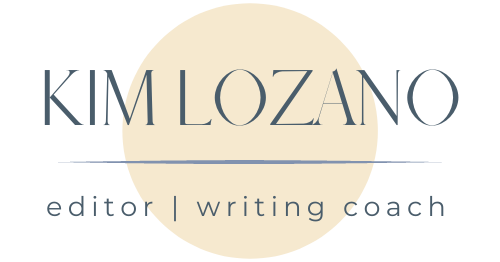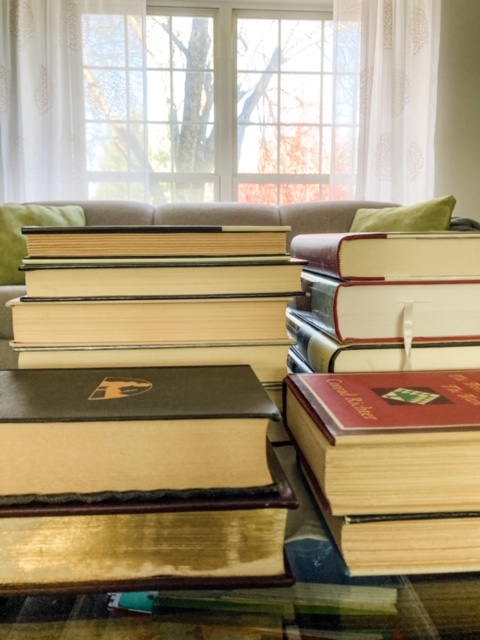Workshops and Webinars
Keep an eye on this page for current and upcoming workshops and webinars!
I love working with groups of writers and I invite you to sign up for my free [Kim’s Notes] to be the first to find out when new classes and events are being offered.
My workshops are like a critique group, but more in-depth. I offer extensive feedback to participants and ask all group members to give thorough comments on the manuscript to each author. The vibe is always encouraging.
Many of my workshops are held in St. Louis but sometimes we’ll have a group that meets via Zoom. Below I’ve listed any current workshops and presentations and some I’ve offered in the past.
SUMMER 2024
ST. LOUIS OASIS: The “Hermit Crab” Form
In the imaginative “hermit crab” form, a writer co-ops the shell of another textual genre—a wedding announcement, a class syllabus, a restaurant menu—and uses that form to organize their short story, essay, or poem. In this class, we will study hermit crab pieces, attempt to write our own, and share our work with the group for friendly feedback.
*6 sessions. Tues 1:00-3:00 pm., May 28/ Jun. 11, 25/ Jul. 9, 23/ Aug. 6
*1:00 p.m.-3:00 p.m., Webster Groves, MO
CLASS FULL
FALL 2024
WRITING SPOOKY STORIES: Free Webinar
Stay tuned for more information!
ST. LOUIS OASIS: Creative Writing Workshop
In this writing workshop, we’ll talk about the basics of writing fiction, memoir, personal essays, and poetry. I’ll provide optional writing prompts and class members will share their writing with the group for friendly feedback. All writing will be done outside of class and class time will focus on discussing student work.
*6 Sessions, Sept. 24/ Oct, 8, 22/ Nov. 5, 19/ Dec. 3
*(2 sections) 10:30 a.m.-12:30 p.m. Clayton, MO | 1:00 p.m.-3:00 p.m. Webster Goves, MO
*CHECK BACK FOR REGISTRATION INFORMATION
sample of past workshops and critique groups:
WRITING THE SHORT SHORT STORY: Call it what you will—quick fiction, fast fiction, microfiction, furious fiction, sudden fiction, or flash fiction—after decades of dormancy, this short short form has undergone a revival. The growing number of online magazines and a renewed interest by traditional publishers have contributed to an expanding readership interested in this brief style. In this workshop we will closely study the work of masters of flash fiction, discuss how the form’s demands of economy and precision can be met in our own work, and share our completed drafts of no more than 500 words.
THE ART OF WRITING FLASH NONFICTION: What is it about miniatures that so captures our imagination? The tiny wingtips of a commuter reading a newspaper on a model train, the turning windmill on a charm bracelet, a working chandelier in a dollhouse…small-scale wonders that fit in our hand. Similarly, the compression and attention to detail in flash nonfiction contribute to the form’s capacity to evoke feeling. In this workshop we will read a variety of flash nonfiction pieces and discuss ways to use the factual and the personal to craft brief essays that, although seemingly small, through sharp focus and smart crafting, can become large.
PROSE WRITING MASTERMIND: This small and focused group will be comprised of eight writers getting together for five weeks for a 5,000 word mastermind intensive. We’re highly focused on first pages here and we’ll critique everyone’s first page and then the entire piece. We’ll discuss point of view, characterization, story structure, scene vs. summary, creating tension, etc. Open to writers working on short stories, creative nonfiction pieces, and first chapters of novels and memoirs.
PROSE POETRY: The prose poem has been described as planting “one foot in prose, the other in poetry, both heels resting precariously on banana peels.” This may be a useful simile, but how do we figure out our footing? Without the line break, where does the boundary between poetry and prose run? This workshop invites prose writers and poets to explore how we might write in sentences and paragraphs to create poetry.

